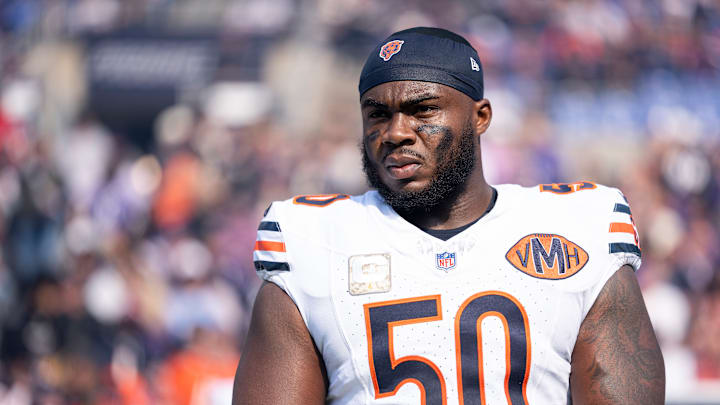The Chicago Bears had a deflating performance on Sunday, losing 30-16 to the Ravens and ending their winning streak at four. The underwhelming offensive performance with Caleb Williams under center has rightfully dominated the discourse, but that shouldn't distract from the fact that the Bears' defense also had one of their worst performances of the season. Going up against Tyler Huntley, who started the week on the practice squad, the Bears gave up the second-most points of the season and allowed 355 total yards.
The run defense was particularly poor against the Ravens, giving up a total of 177 yards on the ground, allowing 5.1 yards per carry. This was especially disappointing, considering that Grady Jarrett returned to the lineup after a three-game absence. The veteran defensive tackle has been out since Week 4 with a knee injury, and many expected him to give the Bears a boost in their run defense. While Jarrett certainly helped the Bears, it didn't come where the team needed it. Instead of a solution, he was part of the problem in their run defense.
Grady Jarrett Fails to Solve the Bears' Big Run Defense Problem
Per Pro Football Focus, Jarrett had two tackles and his first sack of the season in 33 defensive snaps, while receiving an overall 60.1 defensive grade. Where most of his contributions came, however, was in his pass rushing snaps, getting a 75.7 grade. As a run defender, his 47.4 grade left plenty to be desired.
Run defense was where the Bears could have used him more. The interior defensive line has been a concern on that front all season. Even though Gervon Dexter Sr. is in the midst of a very good season, he ranks 57th among 131 qualified interior defensive linemen in run defense grade on PFF. Andrew Billings' struggles across the board have been well-documented since the start of the season.
Unfortunately, this had already been a years-long trend in Jarrett's career before he signed in Chicago. PFF grades don't always tell the entire story for a player, especially over a single game, but you also won't find many Falcons fans who wouldn't support the trend they show. Jarrett's run defense peaked in a three-year stretch from 2017 through 2019, and since then he's struggled in that area, while still contributing as a pass-rusher.
Year | Run Defense Grade | Pass Rush Grade |
|---|---|---|
2017 | 90.1 | 64.4 |
2018 | 84.8 | 86.8 |
2019 | 82.6 | 86.5 |
2020 | 66.2 | 83.3 |
2021 | 61.5 | 67.2 |
2022 | 61.4 | 73.9 |
2023 | 66.9 | 70.3 |
2024 | 61.5 | 60.6 |
The Bears allow 5.3 yards per carry, the third-worst mark in the NFL. They have allowed more rushing yards than all but five teams in the league. While plenty of attention has been given to the lack of pass rush depth and the problems in the cornerback rotation, not enough ink has been spilled on the interior defense. This is obviously a problem considering that the Bears invested significant resources in the position, including signing Jarrett to a three-year, $43.5 million contract in the offseason.
More important than anything is the need for Jarrett to stay healthy and put consistent performances together. His pass-rushing ability will certainly come in handy for a team desperate for more QB pressure, but the hope is that he also boosts the run defense. After watching Derrick Henry carve up the defense all afternoon on Sunday, that should be a top priority.
